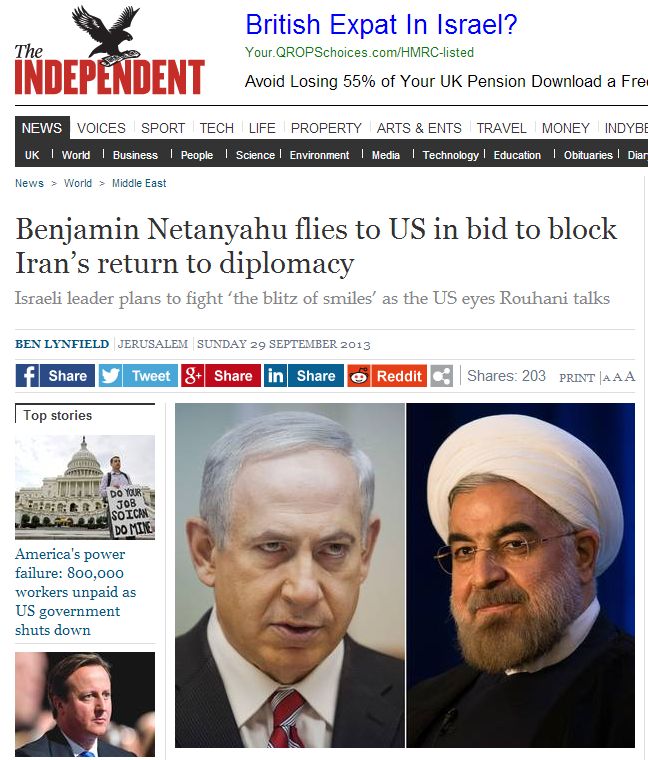October 2, 2013 10:41
by Simon Plosker
This opinion piece by HR Managing Editor Simon Plosker is republished from The Algemeiner.
A recent Washington Post / ABC News opinion poll found that an overwhelming 79 percent of Americans expressed their support for a U.S.-Russian plan to disarm Syria of its chemical weapons.
This, despite 68 percent of those questioned expressing their belief that the plan wouldn’t actually work. How to explain this cognitive dissonance?
It appears that the desire to avoid any sort of military entanglement in the Middle East trumps everything when it comes to Western public opinion – even if people believe that diplomacy is destined to fail.
The same attitude appears to be dominating coverage of Iranian President Rouhani’s current public relations push. Take a look at this screenshot taken from the UK’s Independent newspaper.
Contrast the photo of Benjamin Netanyahu with that of Rouhani. While the Israeli Prime Minister looks tired and perhaps even a little aggressive, the Iranian President exudes serenity.
Subtle to the point of subliminal it might be, but that is exactly the comparison that The Independent’s photo editor wants you to make.
And like those Americans polled on Syrian chemical weapons, the international media (and many politicians) are also desperately trying to avoid conflict with Iran. So they are portraying Rouhani as the leader they would like him to be.
To be sure, Rouhani’s performance at the United Nations was stellar, although he did not have much to live up to. Former president Mahmoud Ahmadinejad stood on the podium at the General Assembly denying the Holocaust and promoting 9/11 conspiracy theories before claiming that he’d felt “bathed in light” during his speech. Certainly not conducive to winning any PR points.
Rouhani’s UN appearance reminds me of one of the UN’s more infamous moments (of which there are too many) when, in 1974, PLO leader Yasser Arafat addressed the General Assembly stating: “Today I have come bearing an olive branch and a freedom fighter’s gun. Do not let the olive branch fall from my hand.”
Rouhani entered the UN with the equivalent of an atomic bomb poking out of his clothing. Yet, like Arafat before him, the crowd focused on the “olive branch” while ignoring the gun. In the subsequent years, Arafat’s gun was responsible for murdering and wounding thousands of innocents. Will Rouhani also follow suit albeit with more horrific weapons?
From Nazi Germany to the Soviet Union, propaganda has always been a potent weapon in the hands of dictators and autocrats. For Western audiences, telegenic public appearances, grand oratory, and clever sound bites will always trump dry policy announcements. This is something that Rouhani clearly recognizes. Even while the U.S. has now started to engage with Iran, it is Rouhani’s change in “tone” that is referred to. After all, very little has changed on the substance.
Iran is still dominated by the will of the Supreme Leader Khameini. Human rights and freedoms are still trampled on, homosexuals persecuted, and minorities subjugated. Whatever Rouhani may say, this is still the same Iran that supports Syrian President Assad, arms and controls the Hezbollahterrorist organization, and promotes terror across the globe.
The media has reported on Rouhani’s return to Iran, where a small number of demonstrators hurled shoes and invectives in protest of Rouhani’s apparent outreach to the West. But even this could be deliberately designed and managed to cast Rouhani as the brave pioneer who needs the support of the West before a window of opportunity closes. Could such a demonstration really have taken place without the acquiescence of the regime?
Perhaps one of the cleverest things Rouhani achieved was yet another tried and tested public relations trick – reframing the argument. By calling for a nuclear-free Middle East, Rouhani successfully diverted attention onto the only other state in the region believed to be in possession of nuclear weapons – Israel.
This could not have been possible, however, without the prevailing zeitgeist that prefers to focus on Israel and her perceived fallibilities while ignoring or excusing away genuine issues that should be much higher on the list of priorities, for example the Syrian civil war, and, yes, the Iranian nuclear program.
So as Benjamin Netanyahu prepares to address the UN General Assembly, he already finds himself cast in the role of spoiler. Like Rouhani’s “tone,” will it be Netanyahu’s tone that the media concerns itself with or will it be the substantive contents of a speech that will seek to remind the world of pertinent facts?
Unfortunately, it seems that Iran has learned the merits of exercising soft power through effective communications and PR. Who needs a nuclear warhead?
Source material can be found at this site.










